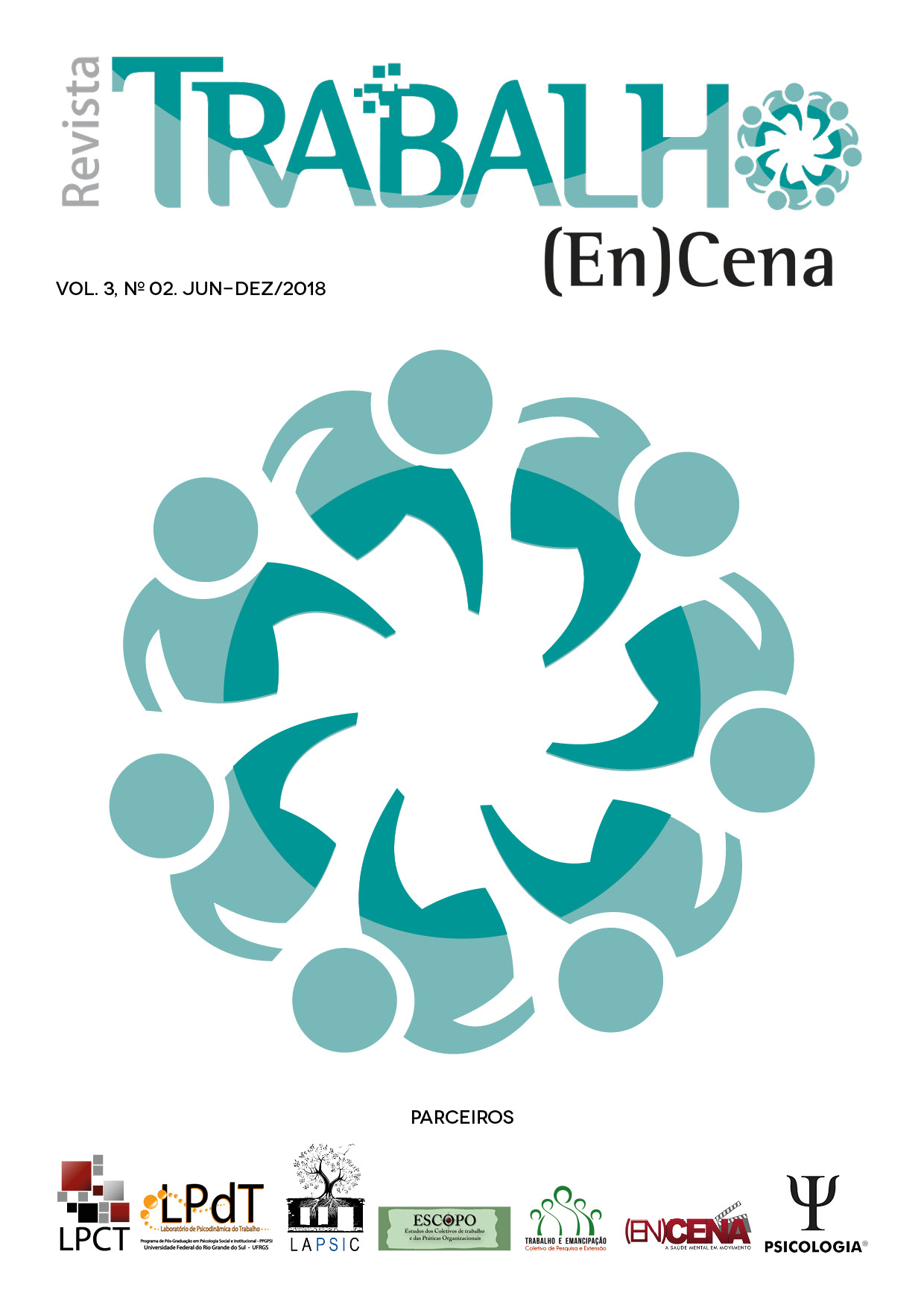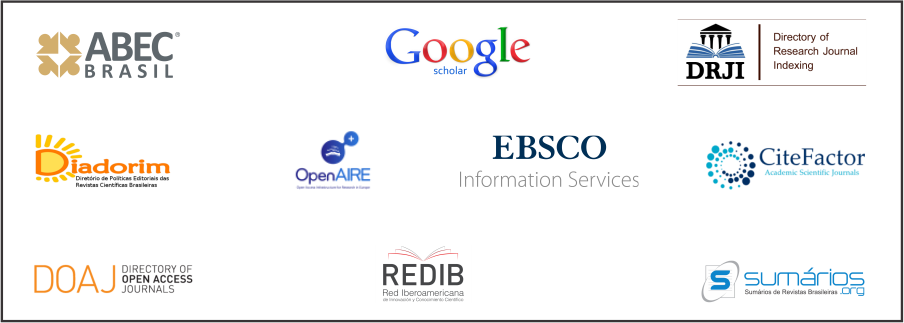La Relación Entre Estrés Ocupacional Y Justicia Organizacional: Un Ensayo
DOI:
https://doi.org/10.20873/2526-1487V3N2P34Resumen
The study of the occupational stress, its sources, functioning dynamic and consequences has been largely studied. There is a consensus that the working environment consists in a powerful source of the occupational stress. Taking the organizational justice construct, it is considered the hypothesis that a working environment filled by organizational injutices can be a powerful stressor, since it requires constant adaptations of the individual to deal with such injustices. This work, of a theoretical nature, proposes a reflection regarding to the relation between the occupational stress and organization justice constructs, concluding from the literature that a working environment filled by injustices can be a potential stressor and points out the importance of investigating empirically this relation.
Citas
Araújo, T. M., Aquino, E., Menezes, G., Santos, C. O., & Aguiar, L. (2003). Aspectos psicossociais do trabalho e distúrbios psíquicos entre trabalhadoras de enfermagem. Revista de Saúde Pública, 37(4), 424-433. Disponível em: http://www.revistas.usp.br/rsp/article/view/31611. Acesso em 28/12/2017.
Assmar, E. M. L., Ferreira, M. C., & Souto, S. D. O. (2005). Justiça organizacional: uma revisão crítica da literatura. Psicologia: reflexão e crítica, 18(3), 443-453. Disponível em: http://www.scielo.br/pdf/%0D/prc/v18n3/a19v18n3.pdf. Acesso em: 22/12/2017
Benzoni, P. E, Barato, C. C., Marchezin, M. A., & Inocente, M. M.. (2016) Afastamento do trabalho e crise do capital: a incapacidade refletindo o contexto. Revista Ser Social, v. 18, n. 39, p. 540-561. Disponível em http://periodicos.unb.br/index.php/SER_Social/article/view/21727/17530 Acesso em 20/09/2017.
Carr, D., & Umberson, D. (2013). The social psychology of stress, health, and coping. In Handbook of social psychology (pp. 465-487). Springer Netherlands. Disponível em: https://link.springer.com/chapter/10.1007/978-94-007-6772-0_16. Acesso em 05/01/2018.
Choi, S. M., Park, Y. S., Yoo, J. H., & Kim, G. Y. (2013). Occupational stress and physical symptoms among family medicine residents. Korean journal of family medicine, 34(1), 49-57. Disponível em: https://synapse.koreamed.org/DOIx.php?id=10.4082/kjfm.2013.34.1.49. Acesso em 05/01/2018.
Fischer, R. (2012). Organizational justice research: present perspectives and challenges. Revista Psicologia Organizações e Trabalho, 12(1), 97-112. Disponível em: http://pepsic.bvsalud.org/scielo.php?pid=S198466572012000100009&script=sci_abstract&tlng=en. Acesso em 04/01/2018.
Francis, L., & Barling, J. (2005). Organizational injustice and psychological strain. Canadian Journal of Behavioural Science/Revue canadienne des sciences du comportement, 37(4), 250-261. Disponível em: http://psycnet.apa.org/record/2005-14046-002. Acesso em 15/12/2017.
Ibrahim, M. E., & Perez, A. O. (2014). Effects of organizational justice, employee satisfaction, and gender on employees' commitment: evidence from the UAE. International Journal of Business and Management, 9(2), 45-59. Disponível em: http://www.ccsenet.org/journal/index.php/ijbm/article/view/30434. Acesso em 05/01/2018.
Karasek Jr, R. A. (1979). Job demands, job decision latitude, and mental strain: Implications for job redesign. Administrative science quarterly, Vol. 24, N. 2 285-308. Disponível em: http://www.jstor.org/stable/2392498. Acesso em 15/12/2017.
Laranjeira, C. A. (2009). O contexto organizacional e a experiência de estresse: uma perspectiva integrativa. Rev Salud Publica, 11(1), 123-33. Disponível em: https://scielosp.org/pdf/rsap/v11n1/v11n1a13.pdf. Acesso em 15/12/2017.
Leow, K. L., & Khong, K. W. (2015). Organizational commitment: The study of organizational justice and leader-member exchange (LMX) among auditors in Malaysia. International journal of business and information, 4(2), 161-198. Disponível em: http://ijbi.org/ijbi/article/view/42. Acesso em 05/01/2018.
Maissiat, G. D. S., Lautert, L., Dal Pai, D., & Tavares, J. P. (2015). Contexto de trabalho, prazer e sofrimento na atenção básica em saúde. Revista gaúcha de enfermagem. Porto Alegre. Vol. 36, n. 2 (jun. 2015), p. 42-49. Disponível em: https://www.lume.ufrgs.br/handle/10183/130175. Acesso em 04/01/2018.
McEwen, B. S., & Wingfield, J. C. (2010). What’s in a name? Integrating homeostasis, allostasis and stress. Hormones and behavior, 57(2), 1-16. Disponível em: https://www.ncbi.nlm.nih.gov/pmc/articles/PMC2815096/ Acesso em 10/01/2018.
Moon, T. W., Hur, W. M., Ko, S. H., Kim, J. W., & Yoon, S. W. (2014). Bridging corporate social responsibility and compassion at work: Relations to organizational justice and affective organizational commitment. Career Development International, 19(1), 49-72. Disponível em: http://www.emeraldinsight.com/doi/full/10.1108/CDI-05-2013-0060. Acesso em 05/01/2018.
Pio Silva, E., Minette, L. J., Souza, A. P., Alves Marçal, M., & Petean Sanches, A. L. (2013). Fatores Organizacionais e psicossociais associados ao risco de LER/DORT em operadores de máquinas de colheita florestal. Revista Árvore, 37(5), 889-895. Disponível em: http://www.redalyc.org/html/488/48829247011/. Acesso em 14/12/2017.
Rai, G. S. (2013). Impact of organizational justice on satisfaction, commitment and turnover intention: Can fair treatment by organizations make a difference in their workers’ attitudes and behaviors?. Journal of Human Sciences, 10(2), 260-284. Disponível em: https://j-humansciences.com/ojs/index.php/ijhs/article/view/2634. Acesso em 04/01/2018.
Sadir, M. A., & Lipp, M. E. N. (2009). As fontes de stress no trabalho. Revista de Psicologia da IMED, 1(1), 114-126. Disponível em: https://seer.imed.edu.br/index.php/revistapsico/article/view/16 Acesso em 15/12/2017.
Sadir, M. A., Bignotto, M. M., & Novaes Lipp, M. E. (2010). Stress e qualidade de vida: influência de algumas variáveis pessoais. Paideia, 20(45), 73-81. Disponível em: http://www.redalyc.org/html/3054/305423775010/. Acesso em 15/12/2017.
Selye, H. (1950). The physiology and pathology of exposure to stress. Acta Medical Publishers, Montreal.
Sousa, M. B. C. D., Silva, H. P. A., & Galvão-Coelho, N. L. (2015). Resposta ao estresse: I. Homeostase e teoria da alostase. Estudos de Psicologia (Natal), 20(1), 2-11. Disponível em:http://www.scielo.br/scielo.php?pid=S1413294X2015000100002&script=sci_abstract&tlng=es. Acesso em 16/12/2017.
Theorell, T., & Karasek, R. A. (1996). Current issues relating to psychosocial job strain and cardiovascular disease research. Journal of occupational health psychology, 1(1), 9-26. Disponível em: http://psycnet.apa.org/record/1996-04477-002. Acesso em 13/12/2017.
Topa, G., Moriano, J. A., & Morales, J. F. (2013). Organizational injustice: third parties' reactions to mistreatment of employee. Psicothema, 25(2), 214-221.Disponível em: http://www.redalyc.org/html/727/72726347002/. Acesso em 04/01/2018.
Tziner, A., & Sharoni, G. (2014). Organizational citizenship behavior, organizational justice, job stress, and workfamily conflict: Examination of their interrelationships with respondents from a non-Western culture. Revista de Psicología del Trabajo y de las Organizaciones, 30(1), 35-42. Disponível em: http://www.sciencedirect.com/science/article/pii/S1576596214700295. Acesso em 04/01/2018.
Wang, J., Lesage, A., Schmitz, N., & Drapeau, A. (2008). The relationship between work stress and mental disorders in men and women: findings from a population-based study. Journal of Epidemiology & Community Health, 62(1), 42-47. Disponível em: http://jech.bmj.com/content/62/1/42.short. Acesso em 04/01/2018.
Descargas
Publicado
Cómo citar
Número
Sección
Licencia
Os direitos autorais dos artigos publicados pela Revista Trabalho EnCena permanecem propriedade dos autores, que cedem o direito de primeira publicação à revista. Os autores devem reconhecer a revista em publicações posteriores do manuscrito. O conteúdo da Revista Trabalho EnCena está sob a Licença Creative Commons de publicação em Acesso Aberto. É de responsabilidade dos autores não ter a duplicação de publicação ou tradução de artigo já publicado em outro periódico ou como capítulo de livro. A Revista Trabalho EnCena não aceita submissões que estejam tramitando em outra Revista. A Revista Trabalho EnCena exige contribuições significativas na concepção e/ou desenvolvimento da pesquisa e/ou redação do manuscrito e obrigatoriamente na revisão e aprovação da versão final. Independente da contribuição, todos os autores são igualmente responsáveis pelo artigo.






